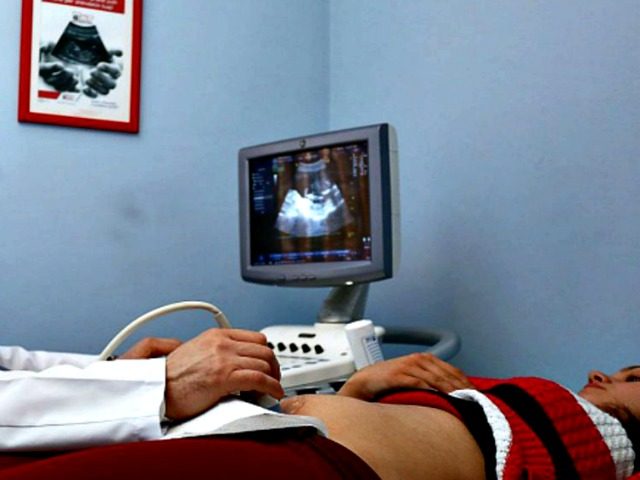A commissioner of Manatee County, Florida, received unanimous approval from his colleagues on the board to move ahead with a plan to explore a local county “heartbeat” abortion ordinance, even though such a ban would be more restrictive than the state’s current abortion law.
Commissioner James Satcher (R) said he would like to model his county’s ordinance after one recently approved by the citizens of Lubbock, Texas, which is now the nation’s largest “Sanctuary City for the Unborn,” reported the Bradenton Times Sunday.
While Florida law currently bans abortions past 24 weeks after conception, Satcher said he aims to seek assistance from state lawmakers to allow Manatee County to exceed the state’s limits.
The county commissioners’ approval means Satcher may use the County Attorney’s Office and County Administrator Scott Hopes as resources to pursue exploration of an ordinance.
“Currently, the attorney tells me that we can’t make a local healthcare ordinance that’s any different than what the state requires,” Satcher said, the Bradenton Herald reported. “The same thing was true in Lubbock, Texas. They wanted to make a heartbeat law and so they went to the state legislature and the governor and had them carve out the preemption.”
“I’m doing the ban because it’s the right thing,” said Satcher, who ran on a pro-life platform in the 2020 election. “We don’t want to be a target that an abortion clinic would ever want to open up here.”
While Manatee County currently has no abortion clinics, the approval by local leaders indicates they hope to keep abortions out of the county.
The Lubbock ordinance, which actually bans abortion within the city’s limits, took effect June 1.
Mark Lee Dickson, director of Right to Life of East Texas and founder of the Sanctuary Cities for the Unborn Initiative, explained the Lubbock ordinance contains two “enforcement mechanisms,” one public and one private.
“While the public enforcement mechanism is dependent upon the overturning of Roe v. Wade, the private enforcement mechanism is immediately enforceable,” he stated. “It is not reliant on the overturning of Roe v. Wade.”
The ordinance provides the private enforcement mechanism by stating:
Any person, corporation, or entity that commits an unlawful act … other than the mother of the unborn child that has been aborted, shall be liable in tort to the unborn child’s mother, father, grandparents, siblings and half-siblings. The person or entity that committed the unlawful act shall be liable to each surviving relative of the aborted unborn child for: (a) Compensatory damages, including damages for emotional distress; (b) Punitive damages; and (c) Costs and attorneys’ fees.
Lubbock’s mayor and city council considered the ordinance after sufficient signatures were gathered from Lubbock citizens to allow for a city council vote. The council ultimately voted 7-0 against the ordinance, reasoning that the Supreme Court’s 1973 decision in Roe v. Wade is considered by many to be the “law of the land.”
The vote of the council, however, was forced by the “Initiative and Referendum” process, Dickson noted, thus allowing for Lubbock citizens to get the ordinance on the ballot and to vote on it themselves on May 1.
Currently, there are 30 Sanctuary Cities for the Unborn, 27 in Texas, two in Nebraska, and one in Ohio.
Lubbock is the only one of the Sanctuary Cities to have passed an ordinance banning abortion after abortions were already offered.
Planned Parenthood and the American Civil Liberties Union (ACLU) subsequently brought a lawsuit against the city of Lubbock, but a federal judge dismissed it, due to a lack of jurisdiction.
While U.S. District Judge James Wesley Hendrix dismissed the lawsuit “without prejudice,” allowing Planned Parenthood to file a lawsuit again in the future, the dismissal means it is still illegal for Planned Parenthood to perform abortions in its Lubbock clinic.
In May, Texas Gov. Greg Abbott (R) also signed into law a “heartbeat” abortion ban that prohibits the procedure once a fetal heartbeat can be detected. Additionally, the Texas law grants power to local municipal governments to enact laws that are more restrictive than those of the state.
Satcher said he has already contacted Florida lawmakers Sen. Jim Boyd (R) and Rep. Tommy Gregory (R) to explore whether the Florida legislature might consider a similar allowance.
“If someone were to say this is a waste of time, I want to say that this commission has really made it a priority to spend unprecedented resources on catching up our infrastructure, making our county ready to deal with the growth coming our way,” Satcher said, according to the Herald. “We’re not doing this at the expense of something else.”

COMMENTS
Please let us know if you're having issues with commenting.